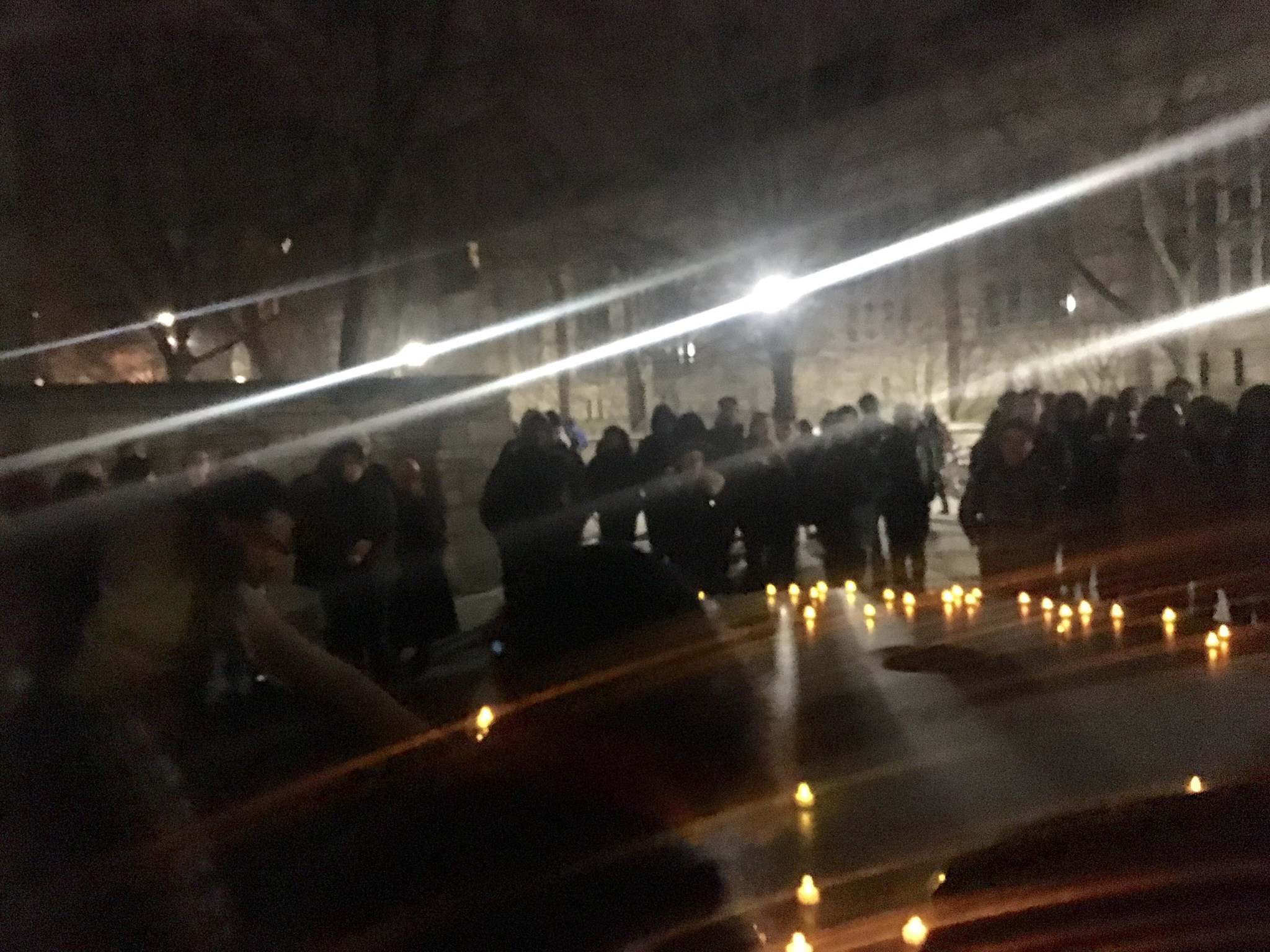
Courtesy of Gabby Deutch
The faint sound of cars rushing down Elm Street could be heard in the distance, but amidst the sea of faces and flickering candles gathered around the Women’s Table, silence gently enveloped students who huddled in the cold on Tuesday night. “Peace be with you,” University Chaplain Sharon Kugler eventually said, concluding the vigil’s opening moment of silence.
Around 200 people gathered on Cross Campus to remember and commemorate the lives of three young black Sudanese men — Mohamedtaha Omar, 23, Adam Mekki, 20, and Muhannad Tairab, 17 — who were killed in Fort Wayne, Indiana execution-style on Feb. 24. Police officials have since ruled out the possibility of a hate crime, though they have been unable to identify a suspect or motive. Still, the death of the three men, two of whom were Muslim, has sparked outrage among many Muslims and non-Muslims alike, who are infuriated by the paucity of mainstream news coverage and the general indifference on the subject within American society. For the Yale community, the tragedy also hits closer to home: two of the young men killed were the cousins of Emi Mahmoud ’16. The Tuesday night Vigil for Our Three Brothers was both a commemoration of the three men and a display of solidarity for Mahmoud. Coinciding with the Islam Awareness Week organized by the Muslim Students Association, the vigil also called to attention specific issues facing the Muslim community both on campus and beyond.
“Thank you for taking the time to be here,” Mahmoud said during the vigil. “I don’t know how to say thank you, but half of these are tears of joy because there were times when we didn’t have anyone to turn to. There were times when people didn’t know about the genocide in Darfur, and when someone died, no one knew and it stayed that way. In a way I’m glad that it’s different now.”
Mahmoud, who recited an original spoken-word poem about the time her brother was shot during her sophomore year of college, moved many in attendance to tears.
Eleanor Pritchett ’19, a production and design staffer for the News, who went to the same high school as Mahmoud, said it was “heartbreaking” to see the impact of this tragedy on someone she knows. Pritchett added that the vigil emphasized the importance of not remaining silent on these issues.
Kugler echoed a similar sentiment, adding that the Tuesday night gathering was critical for healing and empowering attendees.
“It’s important for a community to come together and support one another,” Kugler said. “More than words, the presence of brothers and sisters on a chilly night just being together and being tender is the very best we can do and what we ought to do … I feel helpless at times to ease the pain, but providing some space for people to gather — that really does matter.”
Daad Sharfi ’17, one of the vigil’s organizers, told the News that her first thought upon hearing about the murders was feeling the need to “show up” for Mahmoud, whom Sharfi called a close friend and sister. As a community, Sharfi said it was necessary to stand with Mahmoud in solidarity.
Coordinator of Muslim Life Omer Bajwa also noted Mahmoud’s multiple roles on campus, as well as the greater implications of the Fort Wayne murders.
“Emi is in many communities [on campus]: the Muslim one, the Sudanese one, the [Afro-American Cultural Center], Next Yale,” Bajwa said. “On one level, she is someone whose life intersects with many people around her, and she is very much affected by this. On the larger level, it is drawing attention to the increasingly rampant Islamophobia and the fear-mongering portrayed by mainstream media and politicians. Coupled with the issues of the Black Lives Matter movement, there is still a sense of frustration that black bodies are being brutalized but many people are not aware of it. These are all multiple threads to pay attention to.”
Bajwa added that it is important for Yale students to understand the intersection between the discourse about race, Islam and xenophobia. Although the vigil was not planned as a part of the Islam Awareness Week, Bajwa said he hopes it will help raise awareness of the plight many Muslims and blacks suffer in this country and open up conversation about these issues.
Sharfi also told the News that the point of Islam Awareness Week is to shed light on the fact that Islamophobia does exist and affects people both on this campus and nationwide. What the community can learn from the Fort Wayne tragedy, Sharfi said, is that rhetoric has “very serious consequences.”
“I think race and religion — we can’t say if they played a role or if this is a hate crime — but in the society we live in today, no one seems to care when certain people die. We need to ask ourselves why and we need to correct that,” Sharfi said.
The Muslim Students Association is hosting a Gender in Islam talk and dinner tonight featuring Meriem El Haitami, a fellow and lecturer at the MacMillan Center.







